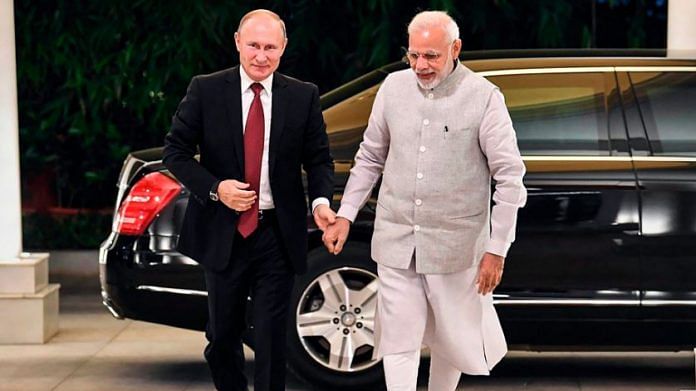New Delhi: India, along with Japan, is now looking to provide a major boost to Prime Minister Narendra Modi’s ‘Act Far East’ policy by kick-starting a trilateral arrangement with Russia this year under the larger Indo-Pacific framework, ThePrint has learnt.
This India-Russia-Japan trilateral is being explored to give fruition to New Delhi’s vision of making the Indo-Pacific strategic initiative “inclusive and not just against one country”, sources told ThePrint.
According to sources, this trilateral cooperation will also be seen as an expansion plan of the Quad grouping, which consists of India, Japan, Australia and the US while furthering Prime Minister Modi’s plan to develop the Russian Far East for which New Delhi had even announced a credit line of $1 billion in September 2019 during his visit to Vladivostok.
A Track-II dialogue on the trilateral took place last week between the think-tanks of the three countries for the first time. It was hosted by the Indian Council of World Affairs (ICWA), which was partnered by the Economic Research Institute for Northeast Asia (ERINA) from Japan and the Far East Investment and Export Agency (FEIEA) of Russia.
According to an outcome document of the dialogue, this trilateral grouping is exploring cooperation in the areas of economic, social and regional issues while also harnessing economic opportunities in the Russian Far East for mutual benefit.
The trilateral cooperation may also look into the “growing links” of these three countries in the Arctic “recognising the interconnected nature of regional development alongside the Russian Far East”, the document states.
D.B. Venkatesh Varma, Indian Ambassador to Russia, while addressing the Russian media Monday said that the trilateral Track-II dialogue can be seen as a “major offshoot” of Modi’s Act Far East policy, including its outreach in the Arctic region.
Sources, however, said that while Russia might have “reservations” in recognising the trilateral arrangement to be part of the Indo-Pacific, it is nevertheless keen to push it forward keeping in mind the development plan of its far east region.
Rajiv Bhatia, a veteran diplomat and distinguished fellow at Gateway House, said, “This is an attempt by the Asian countries to broaden the outreach of the Quad powers. Russia is also a Pacific power and so it’s role in the Indo-Pacific is important. However, Russia has to agree to this and they have to be willing to cooperate. Only if Russia begins to show interest, will it be successful.”
Russia may have reservations
New Delhi has already expressed its desire to bring Moscow into the framework of Indo-Pacific, which Russia is severely against as Moscow sees the Indo-Pacific and Quad as anti-China policies.
“From the Indian and Japanese sides, the interest is quite high, but I personally do not think Russia is much interested in this,” Harsh V. Pant, Professor at King’s College in London and Director, Studies and Head of Strategic Studies at Observer Research Foundation, told ThePrint. “India is hoping that this trilateral might point Russia to a direction but Indo-Pacific is not going to cut much ice with them. But given India’s closeness with Russia, it might be able to persuade Russia to agree to this.”
“While the idea of investing in Russia’s Far East leading up to the Arctic region may find some acceptance, it will be a challenge to have the operational heft,” Pant added.
At the Shangri La Dialogue in 2018, PM Modi had clearly spelt out India’s strategy for Indo-Pacific even as he stressed it to be a “free, open, inclusive region.”
A feasibility study will soon be undertaken to identify areas of cooperation under this trilateral arrangement.
Meanwhile, the Biden administration has already reached out to Kremlin with US President Joe Biden calling his Russian counterpart Vladimir Putin Tuesday.
Also read: India’s diplomatic corps is understaffed, busy with bureaucratic work. That’s a problem



